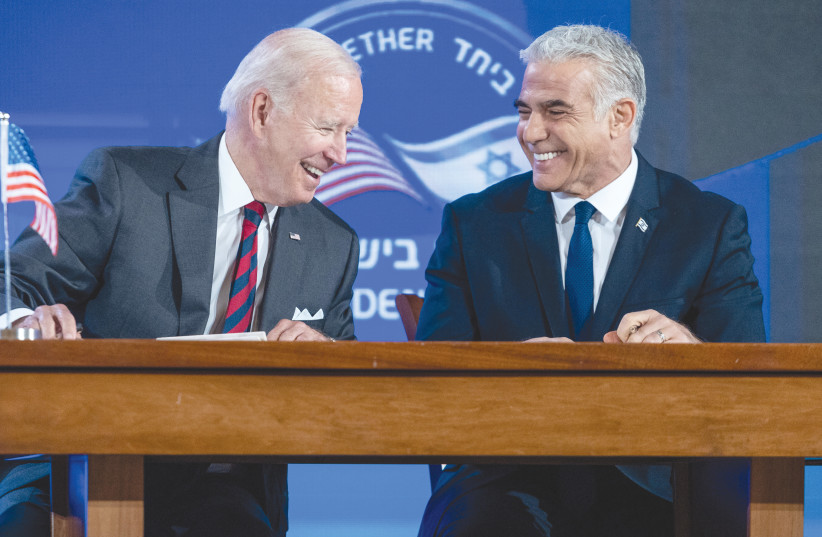These are both encouraging and troubling times for Israel in regard to the ongoing nuclear threat posed by Iran, which has dominated the country’s security attention for over two decades.
Last week, during his visit to Israel, US President Joe Biden and Prime Minister Yair Lapid signed the Jerusalem Declaration – a joint strategic statement – declaring that America vows to use “all elements in its national power” to prevent Iran from obtaining nuclear weapons.
The document outlines the US “commitment never to allow Iran to acquire a nuclear weapon and that it is prepared to use all elements of its national power to ensure that outcome.
“The United States further affirms the commitment to work together with other partners to confront Iran’s aggression and destabilizing activities, whether advanced directly or through proxies and terrorist organizations such as Hezbollah, Hamas, and Palestinian Islamic Jihad.”
It was the strongest signal yet that the US and Israel were closer than ever on their views that Iran poses an existential threat to the Jewish state. In addition, when asked during his interview with Channel 12’s Yonit Levy whether the US would use force to stop Iran’s nuclear program, Biden replied “as a last resort, yes.”

With negotiations between the US and Iran on a return to the 2015 nuclear deal seemingly at an impasse due to intransigence from Tehran, Washigton seems to be digging in its heels, too.
That is what makes Tuesday’s visit to Iran by Russian President Vladimir Putin, where he was expected to meet Iranian Supreme Leader Ayatollah Ali Khamenei, all the more important.
Iran and Russia
Both Iran and Russia need each other, but for totally different reasons.
Chafing under Western economic sanctions and at loggerheads with the US over Tehran’s nuclear program, Iran’s clerics are keen to strengthen strategic relations with Russia in the face of the emerging US-backed Gulf Arab-Israeli bloc that could tilt the Middle East balance of power further away from the Islamic Republic.
Although Biden’s visit to Saudi Arabia didn’t achieve a breakthrough regarding normalizing relations with Israel, it highlighted the concern about Iran that the Gulf Arab countries share with Jerusalem.
The president’s appearance at the Gulf Cooperation Council summit with leaders of six Arab Gulf countries plus Egypt, Jordan and Iraq was aimed at bolstering US positioning in the Middle East and knitting the region closer together against Iran.
That is apparently alarming for both Iran and Russia. According to Reuters, a senior Iranian official said that one of Tehran’s goals for Putin’s visit is “to secure Moscow’s support in its confrontation with Washington and its regional allies.”
Yuri Ushakov – Putin’s foreign policy adviser – told reporters in Moscow that the contact with Khamenei is very important.
Russia’s interest in cozying up to Iran can be seen in the disclosure that the US made ahead of last week’s summit. The White House released satellite imagery indicating that Russian officials have twice visited Iran in recent weeks for a showcase of weapons-capable drones Moscow is looking to acquire to use in its war in Ukraine.
The confluence of Russia and Iran around Ukraine presents a challenging scenario for Israel. Knesset Foreign Affairs and Defense Committee chairman Ram Ben-Barak articulated that concern on Tuesday, telling KAN News that Putin’s attendance at the Tehran summit is “troubling, because the cooperation between Russia and Iran, with Russian technological capabilities, can spell troubling results in many regards.”
Israel is in a particularly precarious position in regard to Russia, because since the onset of the war with Ukraine, it has attempted to refrain from antagonizing the superpower so that it can continue to operate unfettered against Iranian elements in Syria.
If one of the outcomes of the Russia-Iran summit is the restraining of Israel’s ability to stop Iranian weaponry from passing through Syria, it indeed poses a serious problem for the Jewish state.
When two desperate, increasingly isolated countries look to each other for help, the results can be dangerous. With the goodwill and iron-clad support that the US displayed last week still fresh in Israel’s minds, it’s important to remember that ill winds are still blowing in from Moscow and Tehran that could force that theoretical support into military action.